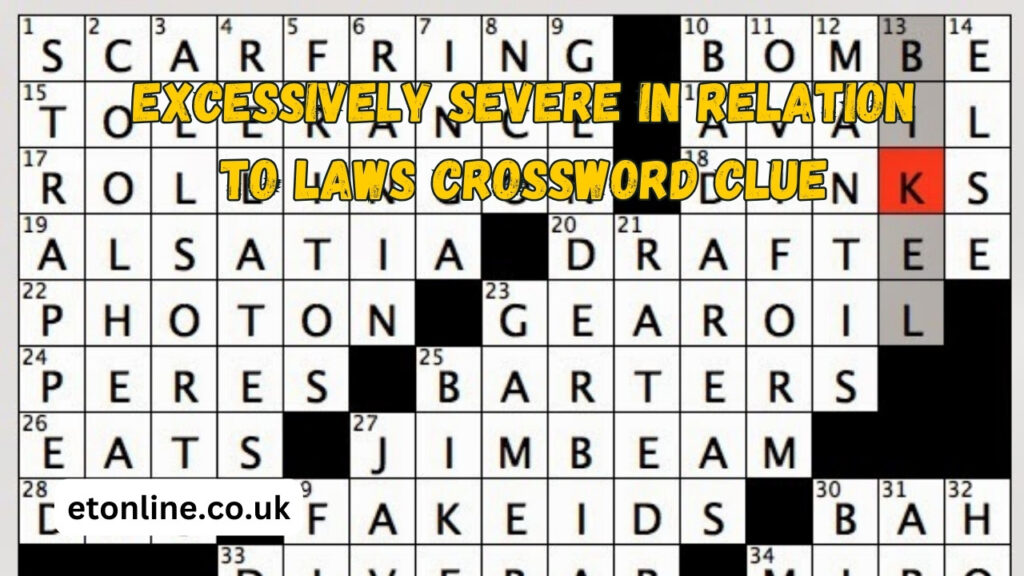Introduction To Excessively Severe In Relation To Laws Crossword Clue
Crossword puzzles are a beloved pastime for many, offering a combination of entertainment and mental stimulation. They challenge your vocabulary, test your knowledge, and provide a sense of satisfaction when you finally crack a difficult clue. However, some clues can be particularly perplexing, especially those that involve nuanced language or legal terminology. One such example is the crossword clue: “Excessively severe in relation to laws.”
This clue requires solvers to think critically about both the meaning and context of the words involved. To successfully solve it, one must understand not just the definition but also the implications of legal severity. In this article, we’ll break down the components of this challenging clue, explore possible answers, and offer tips for solving similar crossword clues in the future.
Breaking Down the Clue
What Does “Excessively Severe” Mean?
“Excessively severe” refers to something that is overly harsh, strict, or unyielding. In the context of laws, this could describe regulations or legal systems that impose harsh penalties or strict enforcement, often to an extreme or unreasonable degree. The idea of severity here is key—it implies a level of strictness that goes beyond what might be considered fair or just.
Understanding “In Relation to Laws”
The phrase “in relation to laws” connects the concept of excessive severity to the legal field. This could pertain to laws that are particularly draconian, or to legal practices that are marked by an inflexible application of rules. In crosswords, such clues often require thinking about legal jargon or historical practices known for their harshness.
Possible Answers to the Clue
1. Draconian
One of the most likely answers to the clue “Excessively severe in relation to laws” is “Draconian.” The term “Draconian” comes from Draco, a 7th-century BC Athenian legislator known for his severe code of laws, where even minor offenses were met with harsh punishments, including death. Over time, the term has come to describe any law or policy that is excessively strict or punitive.
Why “Draconian” Fits:
- Historical Context: The word directly relates to laws that are excessively severe, rooted in history.
- Length: It fits well with the typical length of crossword answers for such clues.
- Usage: “Draconian” is commonly used in legal contexts to describe extreme measures.
2. Stringent
Another possible answer is “Stringent.” While “stringent” generally means strict or precise, in the context of laws, it can imply a harsh or severe application. It’s a word often used in legal discussions about regulations that allow little room for flexibility.
Why “Stringent” Fits:
- Synonym for Severe: It aligns with the idea of strictness or harshness.
- Legal Connotation: It is frequently used to describe tough laws or regulations.
3. Punitive
“Punitive” is another word that might fit the clue, though it’s often used to describe actions or measures intended to punish rather than laws themselves. However, in a broader sense, punitive laws are those designed to impose penalties or punishment, often harshly.
Why “Punitive” Fits:
- Focus on Punishment: The term is related to laws designed to penalize.
- Severity: It conveys a sense of harshness, aligning with “excessively severe.”
Tips for Solving Legal-Themed Crossword Clues
Legal-themed crossword clues can be challenging due to their reliance on specialized vocabulary and concepts. Here are some tips to help you tackle these types of clues:
1. Familiarize Yourself with Legal Terminology
A basic understanding of legal jargon can be immensely helpful. Terms like “jurisdiction,” “litigation,” “subpoena,” and “precedent” often appear in crosswords. Even knowing the origins of words like “Draconian” can give you an edge.
2. Consider Historical Context
Legal terminology often has roots in historical practices or famous legal codes. When a clue hints at legal severity, think about historical figures known for strict laws or justice systems. Terms like “Draconian” or “Napoleonic” might come to mind.
3. Think About Synonyms
Sometimes, crossword clues are more about finding a synonym than decoding the clue directly. If “severe” is the key word, brainstorm all the synonyms you can think of, from “strict” to “harsh” to “unyielding,” and see which might fit.
4. Use Crossword Solving Tools
While it’s more satisfying to solve a crossword clue on your own, sometimes a little help can go a long way. There are many online tools where you can input the clue and possible letters to find matching words. These can help confirm your guesses or lead you to the correct answer.
Common Challenges in Solving Crossword Clues
Vague Clues
One of the biggest challenges in solving crossword puzzles is dealing with vague or abstract clues. The clue “Excessively severe in relation to laws” is a perfect example, as it doesn’t point directly to a specific term. Instead, it requires solvers to interpret the meaning and come up with a term that fits both the clue and the crossword grid.
Multiple Meanings
Many words in English have multiple meanings, which can make solving crosswords tricky. For instance, the word “severe” can mean strict, harsh, or intense, depending on the context. Understanding the different shades of meaning is crucial when trying to solve a challenging clue.
Word Length Constraints
Crossword puzzles often restrict you by the number of letters that will fit in the grid. This adds another layer of difficulty, as you might think of a word that fits the clue but doesn’t match the number of spaces available. It’s important to consider the word length when brainstorming possible answers.
Historical Roots of Legal Terms
Understanding the history behind certain legal terms can enhance your crossword-solving skills. Many words related to law have rich historical backgrounds that inform their modern usage.
The Draco Code: Birth of “Draconian”
The term “Draconian” comes from the legal code established by Draco in ancient Athens. Draco’s laws were notorious for their harshness, including severe penalties for minor offenses. Over time, “Draconian” has become synonymous with any legal measure that is excessively severe or harsh, making it a perfect fit for the crossword clue in question.
Other Legal Terms with Historical Significance
- Napoleonic: Refers to laws or codes inspired by Napoleon Bonaparte’s legal reforms, known for their precision and strict application.
- Hammurabi: While less commonly used in crosswords, the term relates to the Code of Hammurabi, one of the earliest written legal codes, known for its principle of “an eye for an eye.”
The Role of Context in Crossword Clues
Context is everything when it comes to solving crossword puzzles. The same word can have different meanings depending on the surrounding clues or the theme of the puzzle. Paying attention to the overall context of the crossword can provide valuable hints for solving difficult clues.
Theme-Based Puzzles
Some crosswords are designed around a specific theme, which can give you clues about the types of words you should be thinking of. If the puzzle has a legal theme, for instance, you might expect to see terms like “Draconian,” “jurisdiction,” or “litigation.”
Cross-Referencing Clues
Often, crossword clues are interrelated, and solving one can help you solve others. If you’re stuck on a clue like “Excessively severe in relation to laws,” look at the intersecting words. Sometimes, filling in just one or two letters can make the answer much clearer.
Why Crosswords are Great for Mental Agility
Crossword puzzles are more than just a way to pass the time; they’re a workout for your brain. Solving crosswords can improve your vocabulary, enhance your problem-solving skills, and even delay cognitive decline. Understanding and deciphering complex clues like “Excessively severe in relation to laws” is an excellent exercise in critical thinking and linguistic analysis.
Enhancing Vocabulary
Every time you encounter a new word or phrase in a crossword puzzle, you add to your mental dictionary. Over time, this expanded vocabulary can help you solve more challenging puzzles with ease.
Improving Problem-Solving Skills
Crosswords require you to think creatively and make connections between seemingly unrelated concepts. This process of lateral thinking is a valuable skill that can be applied in many areas of life, from academic pursuits to everyday decision-making.
Boosting Memory
Regularly solving crossword puzzles can help keep your memory sharp. The process of recalling words and their meanings exercises your brain, much like how physical exercise keeps your body in shape.
Conclusion
The crossword clue “Excessively severe in relation to laws” is a perfect example of how nuanced and challenging crossword puzzles can be. By breaking down the clue, considering possible answers like “Draconian,” “Stringent,” or “Punitive,” and understanding the importance of legal terminology and historical context, you can improve your crossword-solving skills. Remember to consider the context of the puzzle, familiarize yourself with legal jargon, and practice regularly to enhance your mental agility. Whether you’re a seasoned solver or a newcomer to the world of crosswords, tackling complex clues like this one is a rewarding exercise that sharpens your mind and enriches your vocabulary.
FAQs
What does “Draconian” mean in a legal context?
“Draconian” refers to laws or policies that are excessively harsh or severe, often imposing severe penalties for minor offenses. The term originates from Draco, a 7th-century BC Athenian legislator known for his strict legal code.
How can I improve my crossword-solving skills?
To improve your crossword-solving skills, familiarize yourself with common crossword clues and themes, expand your vocabulary, and practice regularly. Additionally, using crossword-solving tools and considering the context of the puzzle can be helpful.
Why are some crossword clues so vague?
Crossword clues are often intentionally vague to make the puzzle more challenging. These clues require solvers to think critically about the possible meanings and implications of the words involved.
What is the importance of context in solving crossword puzzles?
Context is crucial in solving crossword puzzles because it can provide hints about the theme and the types of words that may fit the clues. Paying attention to the overall context of the puzzle can help you decipher difficult clues.
Are crossword puzzles good for mental health?
Yes, solving crossword puzzles is beneficial for mental health. It can improve vocabulary, enhance problem-solving skills, and boost memory. Regularly engaging in crossword puzzles may also help delay cognitive decline.
What should I do if I’m stuck on a crossword clue?
If you’re stuck on a crossword clue, try filling in intersecting words, consider synonyms, and think about the theme of the puzzle. If needed, use a crossword-solving tool for additional help.



